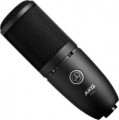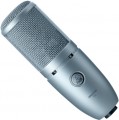Sensitivity describes the signal strength at the output of a microphone when it processes a sound of a certain volume. In this case, sensitivity means the ratio of the output voltage to the sound pressure on the membrane, expressed in decibels. The higher this number, the higher the sensitivity. Note that, as a rule, values in decibels are negative, so we can say this: the closer the number is to zero, the more sensitive the microphone. For example, a -38 dB model outperforms a -54 dB model in this parameter.
It should be borne in mind that high sensitivity in itself does not mean high sound quality - it only allows the device to “hear” a weaker sound. Conversely, low sensitivity is not an unequivocal sign of a bad microphone. The choice for this parameter depends on the specifics of the application: a sensitive device is useful for working with low sounds and in cases where it is necessary to capture the smallest nuances of what is happening, and a “weak” microphone will be convenient at high sound volume or, if necessary, filter out extraneous weak noises. There are models with
sensitivity adjustment(and for models with a headphone output
, headphone volume control may be provided).
A parameter that describes the relationship between the useful signal level and the noise level produced by the microphone. Note that the actual signal-to-noise ratio varies depending on the sound pressure perceived by the microphone. Therefore, in the characteristics it is customary to indicate the option for a standard situation — at a sound pressure of 94 dB. This allows you to compare different models with each other.
In general, this indicator quite clearly characterizes the quality of work of a particular model, since it takes into account almost all significant extraneous noise that occurs during operation. The greater this ratio, the clearer the sound is, the less distortion it has. Values of 64 – 66 dB are considered quite decent, and high-end microphones provide performance of 72 dB and higher.

